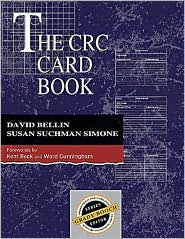

 |

|

Sold Out
Book Categories |
About the Authors.
Figure List.
Foreword.
Preface.
Acknowledgments.
1. CRC: A Problem-Solving Technique.
The CRC Card.
CRC Is Fun!.
Problem Solving and Insight.
A Parable of Insight.
CRC Cards as a Metacognitive Process.
The Challenge of Finding Classes.
Making CRC Work: Project Management Guidelines.
Summary.
2. OO Concepts and Vocabulary.
Thinking About the World as Objects.
Encapsulation.
Instantiation: Classes and Objects.
Inheritance: Classes, Super-classes and Sub-classes.
Abstract Classes.
Polymorphism.
Frameworks and Patterns.
A Case in Point.
Summary.
3. Getting Started with CRC.
Who Writes CRC Cards?
Two Is Only Company; Ten Is a Crowd.
Reading the CRC Card.
Brainstorming: A Discovery Technique.
Description of Brainstorming Principles.
Using Brainstorming to Find Classes.
The Candidate Class List: Where Do Classes Come From?
Read Over All Requirements Documents.
Look Carefully at Reports.
Conduct Interviews.
Examine Documentation and Files.
Summary.
4. Selecting the Core Classes.
Identify Critical Classes.
Clarify System Scope.
Take Advantage of Hot Spots, Frameworks, and Patterns.
Phantoms and Ghosts, Surrogates and Aliases.
Distinguish Attributes from Classes.
The Annotated Candidate Class List.
Questions to Ask of a "Good Class".
Writing Classes on the CRC Cards.
Assigning Responsibilities.
"WHAT and Not HOW."
Responsibility for Behavior.
Responsibility for Knowledge.
Responsibility Detection Pointers.
Assigning Collaborators.
Identifying Hierarchies.
Summary.
5. A Case Study in Stocks and Bonds.
Saver, Soone, & Eayrne's Cyber-Trading System.
Selecting the CRC Team.
Warming Up the Team.
Brainstorming Candidate Classes.
Selecting Core Classes.
Assigning Responsibilities.
Assigning Collaborators.
Identifying Hierarchies.
Summary.
6. CRC Role Play: Living the System.
The Theory Behind the Practice.
The Problem of Shared Meaning.
Beware the Limits of Working Alone.
Active Learning: The Rationale for Interactive Review.
How CRC Role Play Works.
Developing the Role-Play Scenarios.
The Theory of "Aha!"
The Psychological Model.
Confusion is Rarely Permanent.
Role Play: Performing the System Simulation.
Timing the CRC Role-Play Session.
The Warm-Up.
Enactment.
Assessment.
Summary.
7. Fashion Pro: Role-Playing Core Classes.
Fashion Pro: A New Idea in Garment Creation.
The Fashion Pro Analysis Team.
Recapping the Core Classes.
Sketching Scenarios.
Reusing Analysis Frameworks.
Continuing the Scenario List.
Role-Play Enactment.
Assessment.
Summary.
8. Managing Object Analysis.
Object-Oriented Development Changes the SDLC.
The Waterfall SDLC.
The Spiral SDLC.
The Incremental and Iterative SDLC.
Using the OO SDLC to Manage Projects.
The Pilot Project.
Pilot Project Guidelines.
Choosing a Pilot from Our Case Studies.
Getting Started in Your Organization.
Start-up Guidelines.
Timing.
Training.
SWAT Teams or Gurus?
Accommodating Legacy Systems.
Legacy Integration Guidelines.
Communication by Executables.
Direct Reuse in Responsibilities.
Parts Wrappers.
Metrics for CRC Analysis.
Measuring the CRC Analysis.
The Next Step.
9. Case Study 3: Traffic Control.
Traffic Problems in Chapel Hollow.
The CRC Card Team.
The Project Plan.
Segment 1: Simple Intersection.
Segment 2: Complex Intersection.
Segment 3: Zone Control.
Traffic Management Concepts.
Role Play: The First Enactment.
Assessment: Evaluating the Role Play.
Enactment Two: Verifying the Cards.
Using Role Play to Extend the System.
Looking Ahead.
10. Implementing CRC in Smalltalk.
The Smalltalk Programming Environment.
Smalltalk Coding Guidelines.
Naming Conventions.
Using CRC Cards with Smalltalk.
Design Approach.
Analysis versus Program Design.
Going from Analysis to Design and Code.
Design Enhancements.
Constructing Classes.
Constructing Methods.
First Test: Implementing the Detector.
Second Test: A Simple Intersection.
Third Test: A Full Intersection.
Fourth Test: The Specified Intersection.
Saving the Prototype.
Reusing Components.
Tips and Resources for Further Study.
The Code: Smalltalk Test Method Four.
Output from Smalltalk Test Four.
11. Implementing CRC in C++ and JAVA.
Developing C++ Systems.
Class Interface Design.
Designing Constructors.
Private Implementation.
I/O Frameworks.
C++ Coding Guidelines.
Creating the Traffic System Class Interface.
Public Implementation of Constructors.
Private Implementations in the Traffic System.
Traffic Streams.
List & Queue Services.
The Intersection Class.
The Phase Class.
C++ OO Design Priorities.
Member Functions.
The Traffic System I/O Framework.
User Interactions.
Encapsulating Input.
Encapsulating Output.
Moving to JAVA.
The Java Approach to the Traffic System.
Pointers for More.
12. Transition to Methodologies.
CRC Cards Have Limits.
Why Methodologies Are Powerful.
Methodology Adoption Is a Must.
Once Over the Unified (Booch) Method.
Booch Domain Analysis.
Booch System Design.
Once Over the Shlaer-Mellor Method.
Data-Driven Analysis.
Summing Up Shlaer-Mellor.
Using Formal Methods for the Traffic Case.
Unified (Booch-Rumbaugh) Notation.
Shlaer-Mellor Notation.
CRC Card Software.
Summary.
Appendix A. The CRC Road Map.
Appendix B. Bibliography.
Index.
Login|Complaints|Blog|Games|Digital Media|Souls|Obituary|Contact Us|FAQ
CAN'T FIND WHAT YOU'RE LOOKING FOR? CLICK HERE!!! X
 You must be logged in to add to WishlistX
 This item is in your Wish ListX
 This item is in your CollectionThe CRC Card Book (Addison-Wesley Object Technology Series)
X
 This Item is in Your InventoryThe CRC Card Book (Addison-Wesley Object Technology Series)
X
 You must be logged in to review the productsX
 X
 X

Add The CRC Card Book (Addison-Wesley Object Technology Series), Applying the object-oriented paradigm to the development of software requires individuals and teams to think and act differently than when designing procedural projects. While proponents of the object paradigm often say identifying objects is a simple and, The CRC Card Book (Addison-Wesley Object Technology Series) to the inventory that you are selling on WonderClubX
 X

Add The CRC Card Book (Addison-Wesley Object Technology Series), Applying the object-oriented paradigm to the development of software requires individuals and teams to think and act differently than when designing procedural projects. While proponents of the object paradigm often say identifying objects is a simple and, The CRC Card Book (Addison-Wesley Object Technology Series) to your collection on WonderClub |